情态动词详解、典型例题及模拟试题(含标准答案)
人教版英语英语情态动词考点+例题-全面解析含答案百度文库
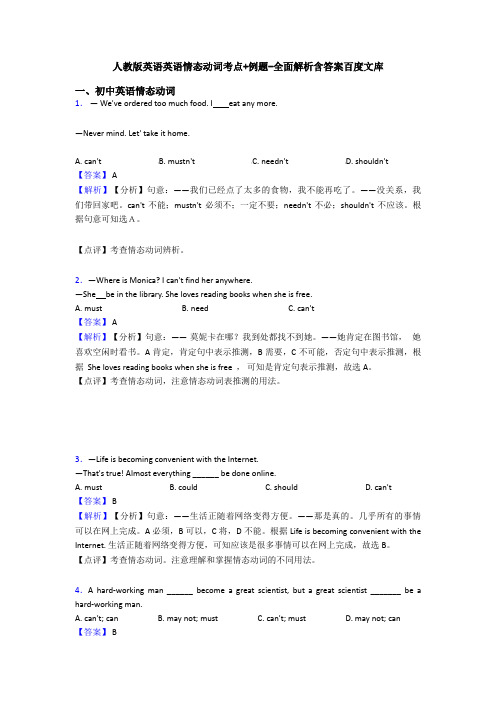
人教版英语英语情态动词考点+例题-全面解析含答案百度文库一、初中英语情态动词1.— We've ordered too much food. I eat any more.—Never mind. Let' take it home.A. can'tB. mustn'tC. needn'tD. shouldn't【答案】 A【解析】【分析】句意:——我们已经点了太多的食物,我不能再吃了。
——没关系,我们带回家吧。
can't不能;mustn't必须不;一定不要;needn't不必;shouldn't不应该。
根据句意可知选A。
【点评】考查情态动词辨析。
2.—Where is Monica? I can't find her anywhere.—She be in the library. She loves reading books when she is free.A. mustB. needC. can't【答案】 A【解析】【分析】句意:——莫妮卡在哪?我到处都找不到她。
——她肯定在图书馆,她喜欢空闲时看书。
A肯定,肯定句中表示推测,B需要,C不可能,否定句中表示推测,根据 She loves reading books when she is free ,可知是肯定句表示推测,故选A。
【点评】考查情态动词,注意情态动词表推测的用法。
3.—Life is becoming convenient with the Internet.—That's true! Almost everything ______ be done online.A. mustB. couldC. shouldD. can't【答案】 B【解析】【分析】句意:——生活正随着网络变得方便。
——那是真的。
几乎所有的事情可以在网上完成。
高三英语情态动词解题技巧分析及练习题(含答案)含解析
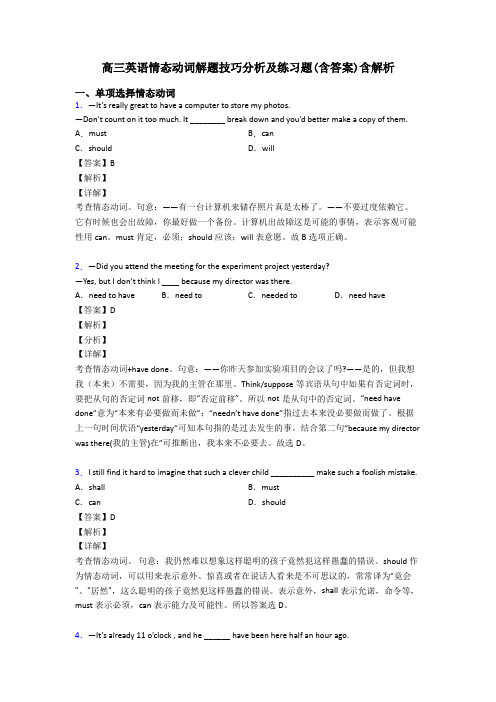
高三英语情态动词解题技巧分析及练习题(含答案)含解析一、单项选择情态动词1.—It’s really great to have a computer to store my photos.—Don’t count on it too much. It ________ break down and you’d better make a copy of them. A.must B.canC.should D.will【答案】B【解析】【详解】考查情态动词。
句意:——有一台计算机来储存照片真是太棒了。
——不要过度依赖它。
它有时候也会出故障,你最好做一个备份。
计算机出故障这是可能的事情,表示客观可能性用can。
must肯定,必须;should应该;will表意愿。
故B选项正确。
2.—Did you attend the meeting for the experiment project yesterday?—Yes, but I don’t think I ____ because my director was there.A.need to have B.need to C.needed to D.need have【答案】D【解析】【分析】【详解】考查情态动词+have done。
句意:——你昨天参加实验项目的会议了吗?——是的,但我想我(本来)不需要,因为我的主管在那里。
Think/suppose等宾语从句中如果有否定词时,要把从句的否定词not前移,即“否定前移”。
所以not是从句中的否定词。
“need have done”意为“本来有必要做而未做”;“needn’t have done”指过去本来没必要做而做了。
根据上一句时间状语“yesterday”可知本句指的是过去发生的事。
结合第二句“because my director was there(我的主管)在”可推断出,我本来不必要去。
情态动词练习题含答案及解析
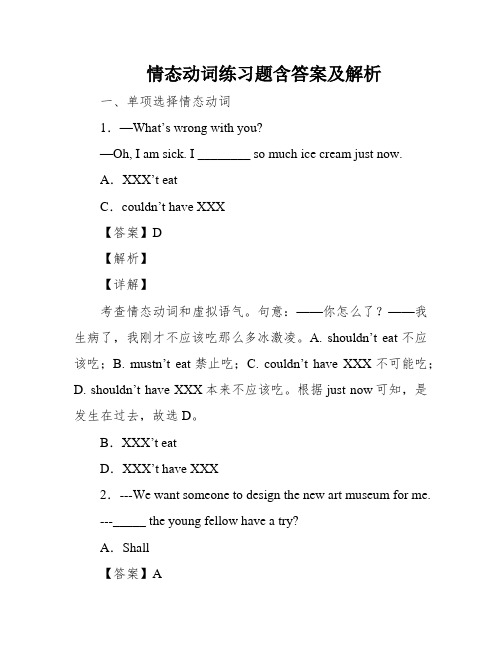
情态动词练习题含答案及解析一、单项选择情态动词1.—What’s wrong with you?—Oh, I am sick. I ________ so much ice cream just now.A.XXX’t eatC.couldn’t have XXX【答案】D【解析】【详解】考查情态动词和虚拟语气。
句意:——你怎么了?——我生病了,我刚才不应该吃那么多冰激凌。
A. shouldn’t eat不应该吃;B. mustn’t eat禁止吃;C. couldn’t have XXX不可能吃;D. shouldn’t have XXX本来不应该吃。
根据just now可知,是发生在过去,故选D。
B.XXX’t eatD.XXX’t have XXX2.---We want someone to design the new art museum for me.---_____ the young fellow have a try?A.Shall【答案】A【剖析】【详解】考查情态动词。
句意:——我们想找人为我设计一个新的艺术博物馆。
——是不是让这位年轻小伙子试一试?shall作为情态动词,用于二三人称,表示"询问","警告","允诺","命令","决心","强制"等语气。
will作为情态动词,用于主语是各种人称的陈述句中,表示"意愿"和"倾向"。
用于第二人称的疑问句中,表"请求"。
故选A。
B.MayC.WillD.Need3.Mr. Baker, some students want to see you. ______ they wait here or outside?A.May【答案】C【解析】【详解】考查Shall的用法。
英语情态动词含答案解析
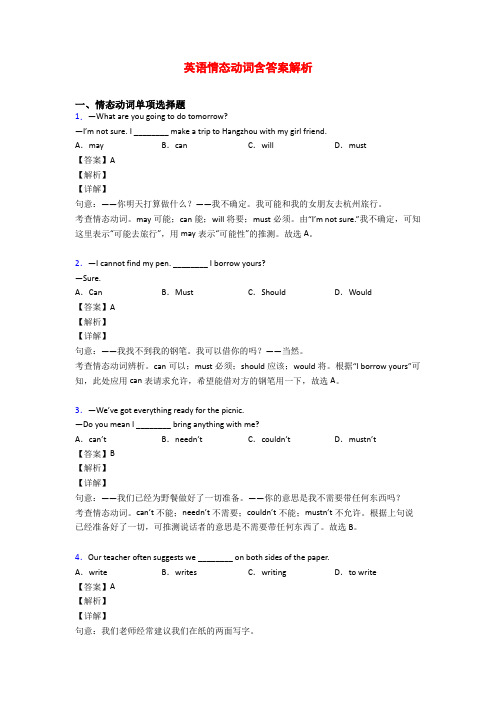
英语情态动词含答案解析一、情态动词单项选择题1.—What are you going to do tomorrow?—I’m not sure. I ________ make a trip to Hangzhou with my girl friend.A.may B.can C.will D.must【答案】A【解析】【详解】句意:——你明天打算做什么?——我不确定。
我可能和我的女朋友去杭州旅行。
考查情态动词。
may可能;can能;will将要;must必须。
由“I’m not sure.”我不确定,可知这里表示“可能去旅行”,用may表示“可能性”的推测。
故选A。
2.—I cannot find my pen. ________ I borrow yours?—Sure.A.Can B.Must C.Should D.Would【答案】A【解析】【详解】句意:——我找不到我的钢笔。
我可以借你的吗?——当然。
考查情态动词辨析。
can可以;must必须;should应该;would将。
根据“I borrow yours”可知,此处应用can表请求允许,希望能借对方的钢笔用一下,故选A。
3.—We’ve got everything ready for the picnic.—Do you mean I ________ bring anything with me?A.can’t B.needn’t C.couldn’t D.mustn’t【答案】B【解析】【详解】句意:——我们已经为野餐做好了一切准备。
——你的意思是我不需要带任何东西吗?考查情态动词。
can’t不能;needn’t不需要;couldn’t不能;mustn’t不允许。
根据上句说已经准备好了一切,可推测说话者的意思是不需要带任何东西了。
故选B。
4.Our teacher often suggests we ________ on both sides of the paper.A.write B.writes C.writing D.to write【答案】A【解析】【详解】句意:我们老师经常建议我们在纸的两面写字。
高中英语情态动词常见题型及答题技巧及练习题(含答案)及解析

高中英语情态动词常见题型及答题技巧及练习题(含答案)及解析一、单项选择情态动词1.I often felt troubled in my teens and my grandma ________ comfort me, saying “Life is like that, dear”.A.would B.might C.should D.must【答案】A【解析】【详解】考查情态动词。
句意:在我十几岁的时候,我经常感到烦恼,我的奶奶会安慰我说,“生活就是这样,亲爱的”。
此处是would+动词原形,表示“过去总是做某事”。
故选A。
2.—I feel a little nervous.—Take it easy. You __________ have difficulty passing the exam when you have prepared for it well.A.mustn’t B.needn’t C.may not D.shouldn’t【答案】D【解析】【详解】考查情态动词。
句意:——我觉得有点紧张。
——不要着急。
当你准备充分时,通过考试应该不会有困难。
A. mustn’t禁止,不允许;B. needn’t不必;C. may not可能不会;D. shouldn’t不应该。
结合句意可知答案为D。
3.—It’s already 11 o’clock , and he ______ have been here half an hour ago.—Maybe he got caught in the rain.A.must B.ought toC.may D.can【答案】B【解析】【详解】考查情态动词。
句意:已经11点了,他半小时前就该到了。
A. must have done必定做了…(表示对过去的推测);B. ought to have done 本应该做的;C. may have done可能已经做过某事;D. can have done本来可以做的(但没有做),根据题意,故选B。
情态动词讲解,练习题和答案(最新整理)

一、情态动词主要用来表示说话人的看法、态度等1. can (could)1) 表示能力,could主要指过去时间。
例如:① Two eyes can see more than one. 两只眼比一只眼看得清。
② Could the girl read before she went to school? 这女孩上学前能识字吗?因为can不能和其他助动词连用,所以表示将来式时用will be able to例:You will be able to skate after you have practiced it two or three times.注意:Can表示一贯的能力,be able to表示客观能力和通过努力可以达到的能力I can’t swim. But I am sure I will be able to swim through more practicing.The fire spread through the hotel, but everyone was able to get out2) 表示允许。
例如:① Can I have a look at your new pen? 我可以看一看你的新钢笔吗?② He asked whether he could take the book out of the reading—room. 他问他可不可以把书带出阅览室。
3) 表惊异、怀疑、不相信等态度。
主要用于否定句、疑问句或感叹句中。
例如:① Where can (could) they have gone to? 他们会去哪儿了呢?② How can you be so careless? 你怎么这么粗心?4) 比较委婉客气地提出问题或陈述看法。
例如:① Can (Could) you lend me a hand? 帮我一把好吗?.② I’m afraid we couldn’t give you an answer today. 恐怕我们今天不能给你答复。
【英语】高考英语情态动词答题技巧及练习题(含答案)
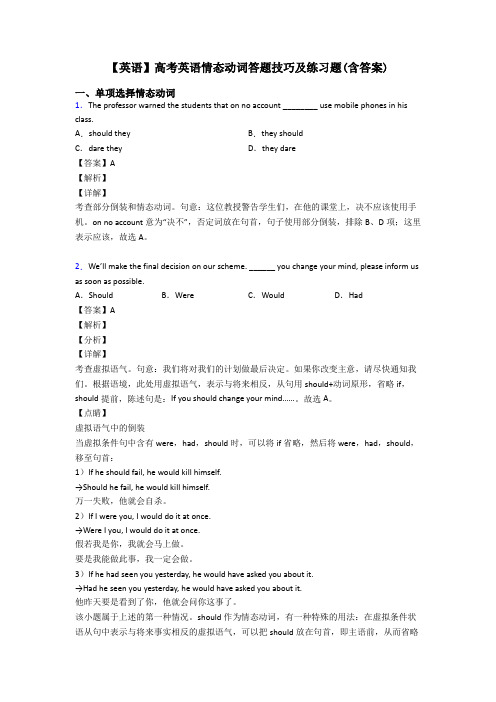
【英语】高考英语情态动词答题技巧及练习题(含答案)一、单项选择情态动词1.The professor warned the students that on no account ________ use mobile phones in his class.A.should they B.they shouldC.dare they D.they dare【答案】A【解析】【详解】考查部分倒装和情态动词。
句意:这位教授警告学生们,在他的课堂上,决不应该使用手机。
on no account意为“决不”,否定词放在句首,句子使用部分倒装,排除B、D项;这里表示应该,故选A。
2.We’ll make the final decision on our scheme. ______ you change your mind, please inform us as soon as possible.A.Should B.Were C.Would D.Had【答案】A【解析】【分析】【详解】考查虚拟语气。
句意:我们将对我们的计划做最后决定。
如果你改变主意,请尽快通知我们。
根据语境,此处用虚拟语气,表示与将来相反,从句用should+动词原形,省略if,should提前,陈述句是:If you should change your mind……。
故选A。
【点睛】虚拟语气中的倒装当虚拟条件句中含有 were,had,should时,可以将if省略,然后将 were,had,should,移至句首:1)If he should fail, he would kill himself.→Should he fail, he would kill himself.万一失败,他就会自杀。
2)If I were you, I would do it at once.→Were I you, I would do it at once.假若我是你,我就会马上做。
英语情态动词总复习经典例题、习题含答案解析百度文库
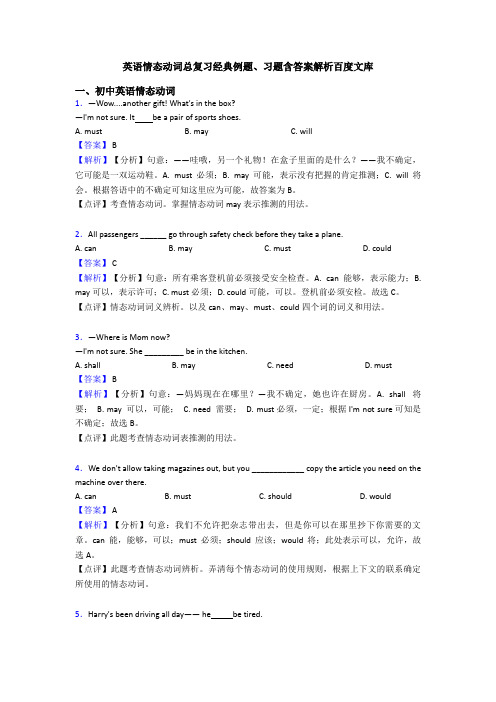
英语情态动词总复习经典例题、习题含答案解析百度文库一、初中英语情态动词1.—Wow....another gift! What's in the box?—I'm not sure. It be a pair of sports shoes.A. mustB. mayC. will【答案】 B【解析】【分析】句意:——哇哦,另一个礼物!在盒子里面的是什么?——我不确定,它可能是一双运动鞋。
A. must必须;B. may可能,表示没有把握的肯定推测;C. will将会。
根据答语中的不确定可知这里应为可能,故答案为B。
【点评】考查情态动词。
掌握情态动词may表示推测的用法。
2.All passengers ______ go through safety check before they take a plane.A. canB. mayC. mustD. could【答案】 C【解析】【分析】句意:所有乘客登机前必须接受安全检查。
A. can能够,表示能力;B. may可以,表示许可;C. must必须;D. could可能,可以。
登机前必须安检。
故选C。
【点评】情态动词词义辨析。
以及can、may、must、could四个词的词义和用法。
3.—Where is Mom now?—I'm not sure. She _________ be in the kitchen.A. shallB. mayC. needD. must【答案】 B【解析】【分析】句意:—妈妈现在在哪里?—我不确定,她也许在厨房。
A. shall 将要; B. may 可以,可能; C. need 需要; D. must必须,一定;根据I'm not sure可知是不确定;故选B。
【点评】此题考查情态动词表推测的用法。
4.We don't allow taking magazines out, but you ____________ copy the article you need on the machine over there.A. canB. mustC. shouldD. would【答案】 A【解析】【分析】句意:我们不允许把杂志带出去,但是你可以在那里抄下你需要的文章。
初中英语情态动词详细用法归纳(含练习及答案)
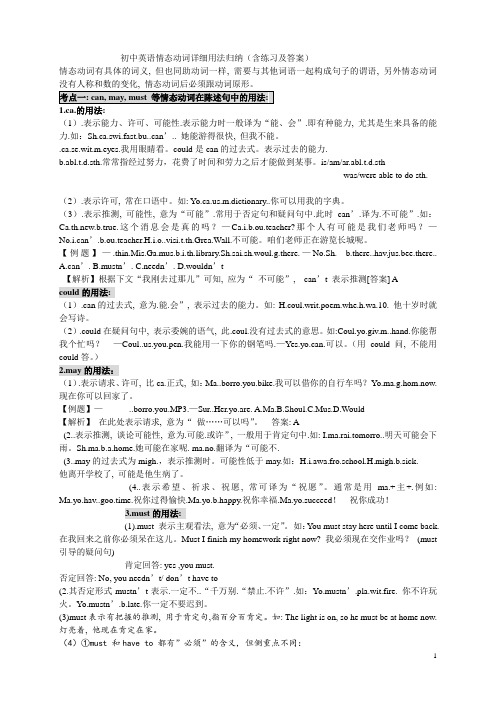
初中英语情态动词详细用法归纳(含练习及答案)情态动词有具体的词义, 但也同助动词一样, 需要与其他词语一起构成句子的谓语, 另外情态动词没有人称和数的变化, 情态动词后必须跟动词原形。
1.ca.的用法:(1).表示能力、许可、可能性.表示能力时一般译为“能、会”.即有种能力, 尤其是生来具备的能力.如:Sh.ca.swi.fast.bu..can’.. 她能游得很快, 但我不能。
.ca.se.wit.m.eyes.我用眼睛看。
could是can的过去式。
表示过去的能力.b.abl.t.d.sth.常常指经过努力,花费了时间和劳力之后才能做到某事。
is/am/ar.abl.t.d.sthwas/were able to do sth.(2).表示许可, 常在口语中。
如: .m.dictionary..你可以用我的字典。
(3).表示推测, 可能性, 意为“可能”.常用于否定句和疑问句中.此时can’.译为.不可能”.如:Ca.th.new.b.true.这个消息会是真的吗?—Ca.i.b.ou.teacher?那个人有可能是我们老师吗?—No.i.can’.b.ou.teacher.H.i.o..visi.t.th.Grea.Wall.不可能。
咱们老师正在游览长城呢。
【例题】—.thin.Mis.Ga.mus.b.i.th.library.Sh.sai.sh.woul.g.there.—No.Sh.__b.there..hav.jus.bee.there..A.can’.B.mustn’.C.needn’.D.wouldn’t【解析】根据下文“我刚去过那儿”可知, 应为“不可能”, can’t 表示推测[答案] Acould的用法:(1).can的过去式, 意为.能.会”, 表示过去的能力。
如: H.coul.writ.poem.whe.h.wa.10. 他十岁时就会写诗。
(2).could在疑问句中, 表示委婉的语气, 此.coul.没有过去式的意思。
情态动词讲解及练习(有答案)

情态动词讲解及练习一、can和could特别说明:(1)could用来表示请求时,语气委婉,主要用于疑问句,不能用于肯定句,答语应用can(即:could不能用于现在时态的简略答语中)。
如:——Could I use your dictionary?——Yes, you can.(否定回答可用:No, I’m afraid not.)(2)can和be able to辨析can(could)和be able to都可以表示能力,意思上没有区别。
但can只有现在式和过去式,而be able to则有更多的形式。
如:I’ve always wanted to able to speak fluent English.Those bags look really heavy, are you sure you’ll be able to carry them on your own?但是,表示在过去某时的某一场合经过一番努力,终于做成了某事,通常不用could,而用was/were able to来表示。
这时,was/were able to相当于managed to do或succeed in doing。
如:After the accident it was a long time before she was able to walk again.The fire was very big, but most people were able to escape from the building.(3) 惯用形式“cannot …too…”表示“无论怎么……也不(过分)”。
如:You cannot be too careful.你越小心越好。
惯用形式“cannot but+ 不定式(不带to)”表示“不得不,只好”。
如:I cannot but admire her determination.我不得不钦佩你的决心。
情态动词详解(含练习题100道和答案)
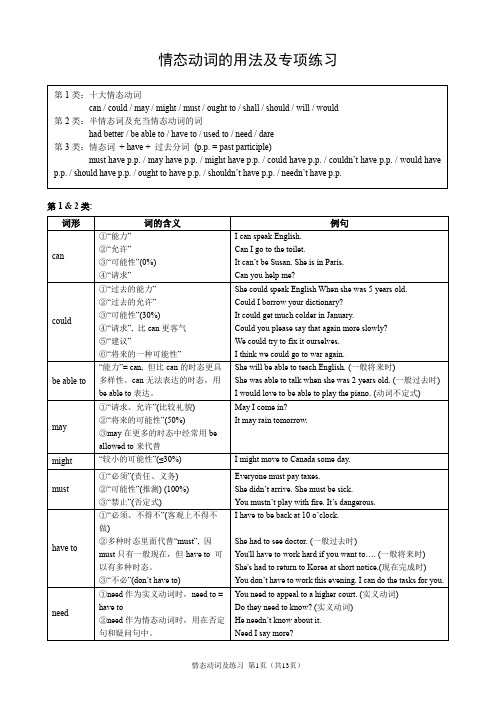
情态动词的用法及专项练习第1 & 2类:第3类:1.could have p.p.①指过去某事有可能发生, 但并未.真的..发生。
They could have won the race, but they didn't try hard enough.He could have studied harder, but he was too lazy and that's why he failed the exam.②指过去有能力做某事, 但并未真的...做过。
I could have stayed up late, but I decided to go to bed early.Julie could have bought the book, but she borrowed it from the library instead.③对过去的发生事情做出一种猜测,但实际上并不知道真假。
仅仅是做一种观点上的表达。
He could have got stuck in traffic.He could have forgotten that we were meeting today.He could have overslept.2. may / might have p.p.(用法与could have p.p.第③点相同)对过去的发生事情做出一种猜测,但实际上并不知道真假。
仅仅是做一种观点上的表达。
He might have got stuck in traffic.He might have forgotten that we were meeting today.He might have overslept.3. couldn't have p.p.渴望、期望做某事, 但由于外部原因不可能做成, 即便是很想做。
是一种虚拟语气。
I couldn't have arrived any earlier. There was a terrible traffic jam (= it was impossible for me to have arrivedany earlier).He couldn't have passed the exam, even if he had studied harder. It's a really, really difficult exam.4. should / ought to have p.p.有一个好主意,该做而没有做。
情态动词专项练习及答案详解
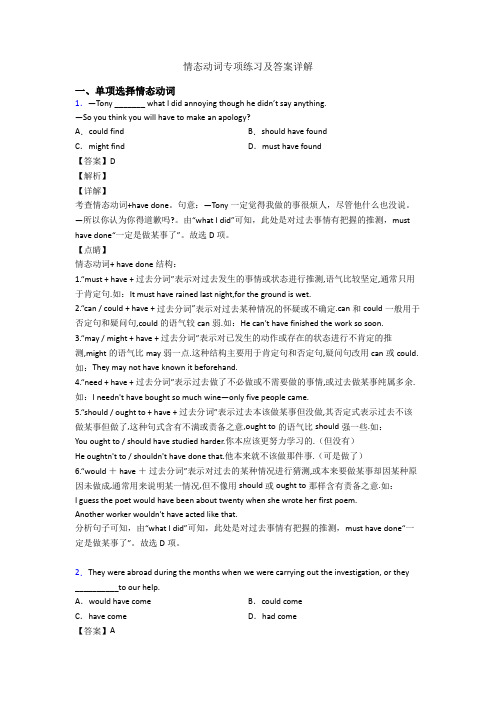
情态动词专项练习及答案详解一、单项选择情态动词1.—Tony _______ what I did annoying though he didn’t say anything.—So you think you will have to make an apology?A.could find B.should have foundC.might find D.must have found【答案】D【解析】【详解】考查情态动词+have done。
句意:—Tony一定觉得我做的事很烦人,尽管他什么也没说。
—所以你认为你得道歉吗?。
由“what I did”可知,此处是对过去事情有把握的推测,must have done“一定是做某事了”。
故选D项。
【点睛】情态动词+ have done结构:1.“must + have + 过去分词”表示对过去发生的事情或状态进行推测,语气比较坚定,通常只用于肯定句.如:It must have rained last night,for the ground is wet.2.“can / could + have + 过去分词”表示对过去某种情况的怀疑或不确定.can和could一般用于否定句和疑问句,could的语气较can弱.如:He can't have finished the work so soon.3.“may / might + have + 过去分词”表示对已发生的动作或存在的状态进行不肯定的推测,might的语气比may弱一点.这种结构主要用于肯定句和否定句,疑问句改用can或could.如:They may not have known it beforehand.4.“need + have + 过去分词”表示过去做了不必做或不需要做的事情,或过去做某事纯属多余.如:I needn't have bought so much wine—only five people came.5.“should / ought to + have + 过去分词”表示过去本该做某事但没做,其否定式表示过去不该做某事但做了,这种句式含有不满或责备之意,ought to的语气比should强一些.如:You ought to / should have studied harder.你本应该更努力学习的.(但没有)He oughtn't to / shouldn't have done that.他本来就不该做那件事.(可是做了)6.“would + have +过去分词”表示对过去的某种情况进行猜测,或本来要做某事却因某种原因未做成,通常用来说明某一情况,但不像用should或ought to那样含有责备之意.如:I guess the poet would have been about twenty when she wrote her first poem.Another worker wouldn't have acted like that.分析句子可知,由“what I did”可知,此处是对过去事情有把握的推测,must have done“一定是做某事了”。
情态动词详解、典型例题及模拟试题(含答案)教学文案
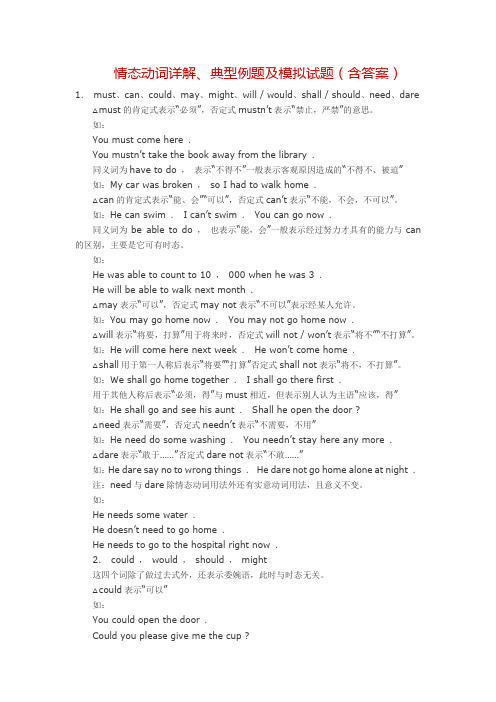
情态动词详解、典型例题及模拟试题(含答案)1.must、can、could、may、might、will / would、shall / should、need、dare △must的肯定式表示“必须”,否定式mustn’t表示“禁止,严禁”的意思。
如:You must come here .You mustn’t take the book away from the library .同义词为have to do ,表示“不得不”一般表示客观原因造成的“不得不、被迫”如:My car was broken ,so I had to walk home .△can的肯定式表示“能、会”“可以”,否定式can’t表示“不能,不会,不可以”。
如:He can swim .I can’t swim .You can go now .同义词为be able to do ,也表示“能,会”一般表示经过努力才具有的能力与can 的区别,主要是它可有时态。
如:He was able to count to 10 ,000 when he was 3 .He will be able to walk next month .△may表示“可以”,否定式may not表示“不可以”表示经某人允许。
如:You may go home now .You may not go home now .△will表示“将要,打算”用于将来时,否定式will not / won’t表示“将不”“不打算”。
如:He will come here next week .He won’t come home .△shall用于第一人称后表示“将要”“打算”否定式shall not表示“将不,不打算”。
如:We shall go home together .I shall go there first .用于其他人称后表示“必须,得”与must相近,但表示别人认为主语“应该,得”如:He shall go and see his aunt .Shall he open the door ?△need表示“需要”,否定式needn’t表示“不需要,不用”如:He need do some washing .You needn’t stay here any more .△dare表示“敢于……”否定式dare not表示“不敢……”如:He dare say no to wrong things .He dare not go home alone at night .注:need与dare除情态动词用法外还有实意动词用法,且意义不变。
【英语】高中英语情态动词的技巧及练习题及练习题(含答案)含解析
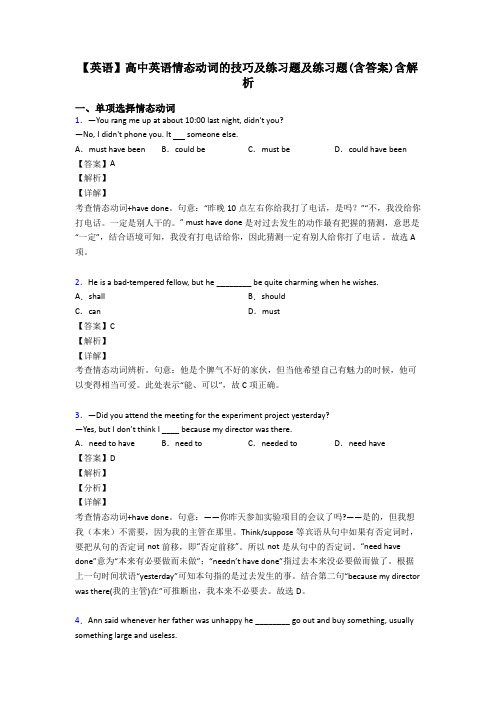
【英语】高中英语情态动词的技巧及练习题及练习题(含答案)含解析一、单项选择情态动词1.—You rang me up at about 10:00 last night, didn't you?—No, I didn't phone you. It someone else.A.must have been B.could be C.must be D.could have been 【答案】A【解析】【详解】考查情态动词+have done。
句意:“昨晚10点左右你给我打了电话,是吗?”“不,我没给你打电话。
一定是别人干的。
” must have done 是对过去发生的动作最有把握的猜测,意思是“一定”,结合语境可知,我没有打电话给你,因此猜测一定有别人给你打了电话。
故选A 项。
2.He is a bad-tempered fellow, but he ________ be quite charming when he wishes.A.shall B.shouldC.can D.must【答案】C【解析】【详解】考查情态动词辨析。
句意:他是个脾气不好的家伙,但当他希望自己有魅力的时候,他可以变得相当可爱。
此处表示“能、可以”,故C项正确。
3.—Did you attend the meeting for the experiment project yesterday?—Yes, but I don’t think I ____ because my director was there.A.need to have B.need to C.needed to D.need have【答案】D【解析】【分析】【详解】考查情态动词+have done。
句意:——你昨天参加实验项目的会议了吗?——是的,但我想我(本来)不需要,因为我的主管在那里。
Think/suppose等宾语从句中如果有否定词时,要把从句的否定词not前移,即“否定前移”。
英语情态动词题20套(带答案)及解析
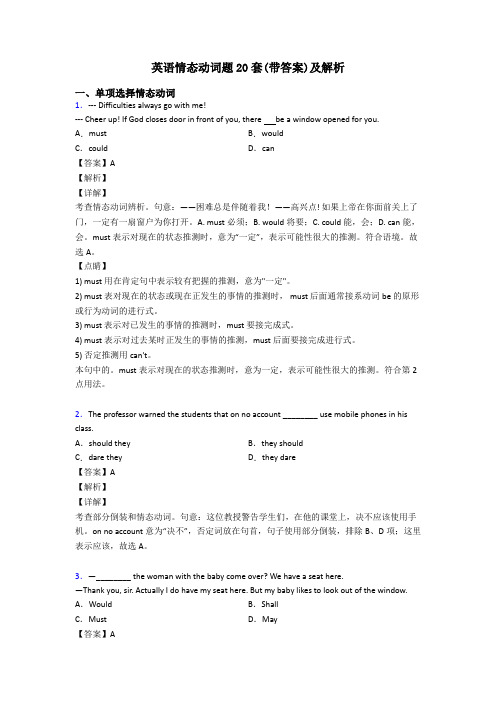
A.shallB.must
C.canD.should
【答案】D
【解析】
【详解】
考查情态动词。句意:我仍然难以想象这样聪明的孩子竟然犯这样愚蠢的错误。should作为情态动词,可以用来表示意外、惊喜或者在说话人看来是不可思议的,常常译为"竟会"、"居然",这么聪明的孩子竟然犯这样愚蠢的错误。表示意外,shall表示允诺,命令等,must表示必须,can表示能力及可能性。所以答案选D。
【答案】B
【解析】
试题分析:考查情态动词用法。Shouldn’t have done本不应该做某事,实际上却做了(虚拟语气);couldn’t have done不可能做某事(对过去情况的推测);needn’t have done本不需要做某事,实际上却做了(虚拟语气);句意:我的姐姐昨天下午在街上遇见了他,所以他不可能去听了你的演讲。故B正确。
3. shall用于第一、第三人称疑问句中,表示说话人征求对方的意见或向对方请示。如:Shall we begin our lesson? When shall he be able to leave the hospital?
4. shall用于第二、第三人称,表示说话人给对方命令、警告、允诺或威胁。如:You shall fail if you don't work harder.(警告)He shall have the book when I finish reading.(允诺)He shall be punished.(威胁)
高考英语情态动词讲解及习题(附答案)
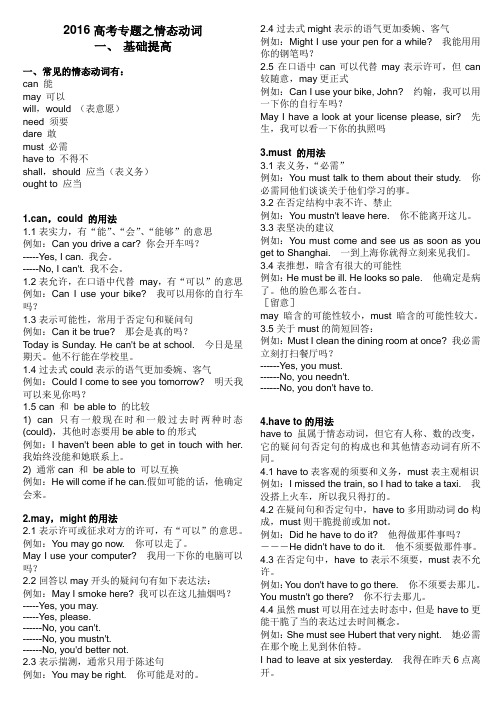
2016高考专题之情态动词一、基础提高一、常见的情态动词有:can 能may 可以will,would (表意愿)need 须要dare 敢must 必需have to 不得不shall,should 应当(表义务)ought to 应当1.can,could 的用法1.1表实力,有“能”、“会”、“能够”的意思例如:Can you drive a car? 你会开车吗?-----Yes, I can. 我会。
-----No, I can't. 我不会。
1.2表允许,在口语中代替may,有“可以”的意思例如:Can I use your bike?我可以用你的自行车吗?1.3表示可能性,常用于否定句和疑问句例如:Can it be true?那会是真的吗?Today is Sunday. He can't be at school.今日是星期天。
他不行能在学校里。
1.4过去式could表示的语气更加委婉、客气例如:Could I come to see you tomorrow?明天我可以来见你吗?1.5 can 和be able to 的比较1) can 只有一般现在时和一般过去时两种时态(could),其他时态要用be able to的形式例如:I haven't been able to get in touch with her.我始终没能和她联系上。
2) 通常can 和be able to 可以互换例如:He will come if he can.假如可能的话,他确定会来。
2.may,might的用法2.1表示许可或征求对方的许可,有“可以”的意思。
例如:You may go now.你可以走了。
May I use your computer?我用一下你的电脑可以吗?2.2回答以may开头的疑问句有如下表达法:例如:May I smoke here? 我可以在这儿抽烟吗?-----Yes, you may.-----Yes, please.------No, you can't.------No, you mustn't.------No, you'd better not.2.3表示揣测,通常只用于陈述句例如:You may be right.你可能是对的。
英语情态动词讲解及练习(附答案)

英语情态动词讲解及练习(附答案)情态动词讲解定义:情态动词表示说话人对动作的态度,比如:需要,可能,意愿,猜测或者怀疑等等。
情态动词本身有一定意思,但不完全,不能单独作谓语,必须与动词原形连用。
否定句中,在情态动词后面加not。
情态动词有:must, shall, should, had better 词形无变化can(could), may(might), will(would) 词形有变化need既可以是情态动词,也可以是实义动词,具有双重性。
一、can 表示“能,会”,否定为:can’t = can not = cannot 其过去式为:could→couldn’t(1)表示会做某事,有能力做某事。
意思= be able toe.g. He can speak English, but he can’t speak Japanese.= He is able to speak English, but he isn’t able to speak Japanese.I could smile but I couldn’t speak w hen I was 2 months old.= I was able to smile but I wans’t able to speak when I was 2 months old.区别:① can只用于现在时和过去时(could), be able to 可用于各种时态。
e.g. They will be able to tell you the news soon.Mingming has been able to count numbers.② be able to 不与can连用,但可以和其他情态动词或助动词连用。
e.g. He may be able to speak English very well some day in the future.He may can speak…………………………………………………..He can be able to speak……………………………………………..(2)用于征求意见——Can /Could /May /Might I(we) do sth?——Yes, you can/may. / Of course you can.——No(Sorry), you can’t. /mustn’t.注意:①此处的could和might都不表示过去,只是语气上的委婉,不用作回答。
情态动词详解、典型例题及模拟试题(含答案)
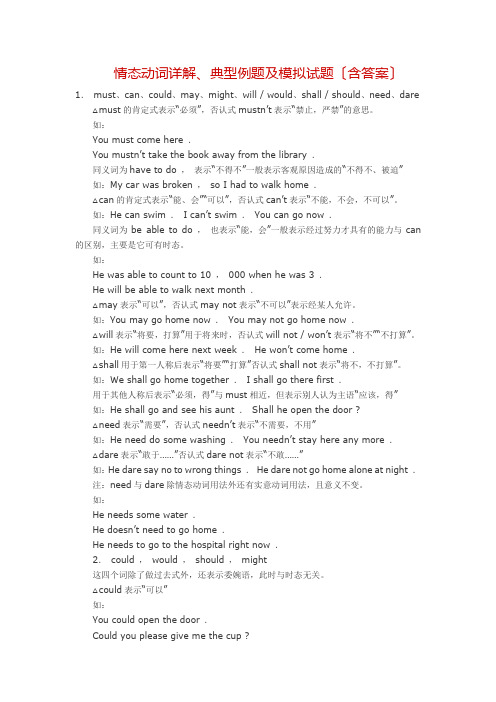
情态动词详解、典型例题及模拟试题〔含答案〕1.must、can、could、may、might、will / would、shall / should、need、dare △must的肯定式表示“必须”,否认式mustn’t表示“禁止,严禁”的意思。
如:You must come here .You mustn’t take the book away from the library .同义词为have to do ,表示“不得不”一般表示客观原因造成的“不得不、被迫”如:My car was broken ,so I had to walk home .△can的肯定式表示“能、会”“可以”,否认式can’t表示“不能,不会,不可以”。
如:He can swim .I can’t swim .You can go now .同义词为be able to do ,也表示“能,会”一般表示经过努力才具有的能力与can 的区别,主要是它可有时态。
如:He was able to count to 10 ,000 when he was 3 .He will be able to walk next month .△may表示“可以”,否认式may not表示“不可以”表示经某人允许。
如:You may go home now .You may not go home now .△will表示“将要,打算”用于将来时,否认式will not / won’t表示“将不”“不打算”。
如:He will come here next week .He won’t come home .△shall用于第一人称后表示“将要”“打算”否认式shall not表示“将不,不打算”。
如:We shall go home together .I shall go there first .用于其他人称后表示“必须,得”与must相近,但表示别人认为主语“应该,得”如:He shall go and see his aunt .Shall he open the door ?△need表示“需要”,否认式needn’t表示“不需要,不用”如:He need do some washing .You needn’t stay here any more .△dare表示“敢于……”否认式dare not表示“不敢……”如:He dare say no to wrong things .He dare not go home alone at night .注:need与dare除情态动词用法外还有实意动词用法,且意义不变。
(完整版)初中英语情态动词讲解练习和答案解析.docx
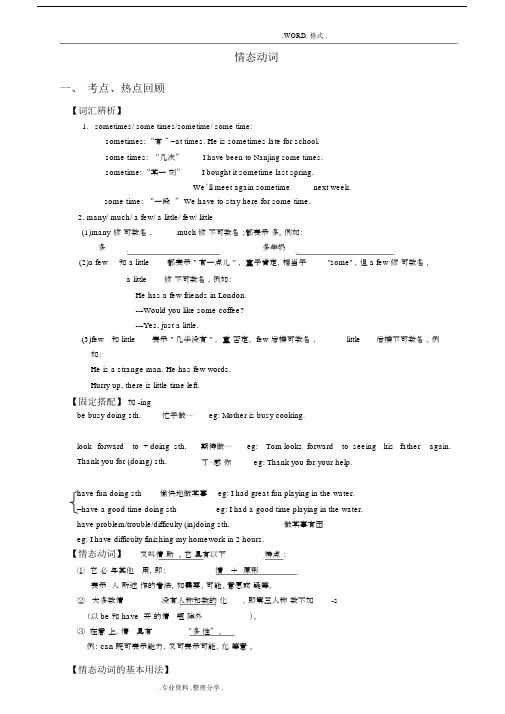
.WORD. 格式 .情态动词一、考点、热点回顾【词汇辨析】1.sometimes/ some times/sometime/ some time:sometimes: “有” =at times. He is sometimes late for school.some times:“几次”I have been to Nanjing some times.sometime: “某一刻”I bought it sometime last spring.We’ll meet again sometime next week.some time:“一段” We have to stay here for some time.2. many/ much/ a few/ a little/ few/ little(1)many 修可数名,much修不可数名;都表示多。
例如:多多牛奶(2)a few和a little都表示"有一点儿",重于肯定,相当于"some" ,但 a few 修可数名,a little修不可数名,例如:He has a few friends in London.---Would you like some coffee?---Yes, just a little.(3)few和little表示"几乎没有",重否定。
few后接可数名,little后接不可数名。
例如:He is a strange man. He has few words.Hurry up, there is little time left.【固定搭配】加 -ingbe busy doing sth.忙于做⋯⋯eg: Mother is busy cooking.look forward to + doing sth. Thank you for (doing) sth.期待做⋯⋯eg: Tom looks forward to seeing his father again.了⋯感你eg: Thank you for your help.have fun doing sth愉快地做某事eg: I had great fun playing in the water. =have a good time doing sth eg: I had a good time playing in the water. have problem/trouble/difficulty (in)doing sth.做某事有困eg: I have difficulty finishing my homework in 2 hours.【情态动词】又叫情助。
- 1、下载文档前请自行甄别文档内容的完整性,平台不提供额外的编辑、内容补充、找答案等附加服务。
- 2、"仅部分预览"的文档,不可在线预览部分如存在完整性等问题,可反馈申请退款(可完整预览的文档不适用该条件!)。
- 3、如文档侵犯您的权益,请联系客服反馈,我们会尽快为您处理(人工客服工作时间:9:00-18:30)。
情态动词详解、典型例题及模拟试题(含答案)
1.must、can、could、may、might、will / would、shall/ should、ne ed、dare
△must的肯定式表示“必须”,否定式mustn’t表示“禁止,严禁”的意思。
如:
You must come here .
Youmustn’ttake the bookawayfrom thelibrary .
同义词为haveto do, 表示“不得不”一般表示客观原因造成的“不得不、被迫”如:My carwas broken,so I had towalkhome .
△can的肯定式表示“能、会”“可以”,否定式can’t表示“不能,不会,不可以”。
如:He can swim . I can’t swim . You cango now .
同义词为be able to do, 也表示“能,会”一般表示经过努力才具有的能力与can 的区别,主要是它可有时态。
如:
He wasable to count to 10, 000 when hewas3 .
He will be able to walk next month .
△may表示“可以”,否定式maynot表示“不可以”表示经某人允许。
如:You may gohomenow .You may not go home now .
△will表示“将要,打算”用于将来时,否定式willnot/won’t表示“将不”“不打算”。
如:He willcomeherenext week . He won’tcome home .△shall用于第一人称后表示“将要”“打算”否定式shall not表示“将不,不打算”。
如:Weshallgo home together .I shall gothere first .
用于其他人称后表示“必须,得”与must相近,但表示别人认为主语“应该,得”
如:He shallgo and see his aunt.Shall he open the door ?
△need表示“需要”,否定式needn’t表示“不需要,不用”
如:Heneed do some washing .You needn’t stay here any more .
△dare表示“敢于……”否定式dare not表示“不敢……”
如:He dare say no to wrong things. He darenotgo homealoneatnight .
注:need与dare除情态动词用法外还有实意动词用法,且意义不变。
如:
Heneedssomewater.
He doesn’t need togo home .
He needs to go tothe hospital right now .
2. could , would,should ,might
这四个词除了做过去式外,还表示委婉语,此时与时态无关。
△could表示“可以”
如:
You could open the door.
Could youplease givemethe cup ?
CouldIcomein ?
△would表示“可以,是否可以”此时一般只用疑问式且只用于you
如:
Would youpleasegiveme the book?
Would you please notgo away ?
△wouldlike to do表示“愿意,喜欢”
如:
Wouldyoulike to gowithme?I wouldliketo buythis book .
△should表示“应该”“必须”;oughtto 用于表示“应该”(强调客观上):(大多情况可用should 代替)
如:
You should give me the bookback .
What should we do next?
He shouldn’t goout on such a bad day .
You oughtto go tosee the doctor.
You oughtn’t(ought not)to smoke somuch.
Each member shall wearaname card.(表示规定)
Ishould answer his letter as soon as possible.(表示应该)
Youshouldn’t judge aman alwaysby the clothes.
Therulesshall take effecton Jan. 1st.
△might表示“可以”与may基本上可互换,但他语气较弱。
如:
You might gohome , but youmustfinishyour homework .
3. 情态动词之间的问答与反义疑问句
May/ Can Igo homenow ?
Must I stay here ?
Shall we go now ?All right .
Need I return the book ?
ShallI make some tea?
【典型例题】
[例1] It’s nearly seveno’clock.Jack ______be hereat anymoment.
A.must B. need C.should D.can。
